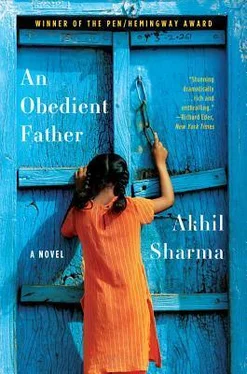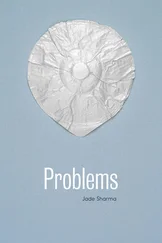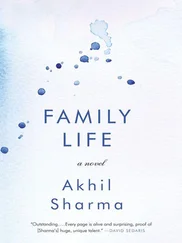Seven or eight men in their twenties stood bunched together several meters to the right of me on the sidewalk. The top buttons of their shirts were open, and as if this were how they recognized each other, most wore canvas shoes with clumsily copied foreign emblems sewn on. The hoodlums were staring at a Bata shoe shop directly opposite the alleyway. Behind an iron grille fixed to the ground by heavy locks was a large window displaying Bata shoes. The shop was owned by a Sikh, and I knew it was symbolically important that the first shop looted belong to a Sikh or a Muslim. If I died in a riot, it occurred to me, I would never have to speak with Anita again.
The hoodlums talked and joked among themselves, but kept looking at the shoe shop. Their bodies were tensed and, when not moving, tilted automatically toward the shop. I wondered if what had happened after Indira Gandhi's assassination would be repeated. For several days after her murder, the roofs of most of the houses in the Old Vegetable Market remained crowded and bunches of looting men roamed the streets. Periodically people spilled from their homes and a riot started. Then, after a while, a tank or some military jeeps appeared and the roads were abandoned once more. The butchering of Sikhs and Muslims — shooting them, knifing them, hanging them, setting them on fire — continued for weeks after they had been chased out of mixed neighborhoods. I stared at the shop, the hoodlums, the people on the roof I felt as if the blue sky had become solid and the whole country was now under a lid. Not wanting to return home, I stayed where I was.
A half hour passed. I watched the blue sky and the silent, full roofs. The world felt impossible, like a door larger than the building it belonged to. But this impossibility was strangely comforting. The world had changed, and I must have been changed with it.
The Sikh's wife stepped out of a narrow, dark staircase next to the shop. She was fat and wore a green salwar kameez. I had never spoken with her but had seen her working in the shop and buying milk from the same milkman I used. She stood in front of the steps for a moment and looked up and down the road. She avoided meet-
ing any of the eyes that were focused on her. When she stepped aside, two young boys, about six and ten, came out from the staircase. They were dressed in blue-and-maroon school uniforms and their hair was neatly bunned in small white handkerchiefs. They looked as if they had just bathed. The boys' wet cleanness made me think of newborn rabbits. Making them look young was smart, but I doubted it would help. A moment after the boys, a fat white-haired woman dressed in a widow-white salwar kameez emerged. This was the Sikh's mother. I began to feel sad.
The Sikh's wife stepped to the edge of the sidewalk and waved to the rickshaw driver. He looked at her coolly and continued to smoke. He was eighteen or nineteen and had short bristly hair. To be out on such a day signified the rickshaw driver's predatoriness. One of the hoodlums said, "Bitch." Everyone else remained silent and the word expanded in the air. I sensed the attention of people on the roof The older boy took the younger one's hand. The woman kept motioning for the rickshaw driver long after it was obvious that he was not going to move. Perhaps she thought that if she stopped motioning, the next part of something preordained would happen.
I wondered how much time it would take to murder the Sikhs. The men would probably make a game of getting them away from the stairs. They might be threatened till the women and children started crying and pleading to be allowed to leave. After the hoodlums had let themselves be bribed, the rickshaw would be ordered forward. The Sikhs would get in. The rickshaw driver would pedal in the exact center of the road and be leaning as far away from his passengers as possible. Then the hoodlums might start running alongside the rickshaw, laughing and talking among themselves, or completely silently. They would begin punching and tugging the women and children. After a block or two, they might grab one of the boys and drag him into the street. Then the rickshaw driver would jump off and run away. I remembered the dead naked Muslim boy of forty years ago, whose shoulder had been opened so that white bone showed.
"Go, friend," I said to the rickshaw driver. I was surprised at hav-
ing spoken. Once the words were uttered, I felt complete confidence. The rickshaw driver looked at me. He was small, with thin arms. I smiled and cocked my head in the Sikhs' direction. "They are women and children," I said in a loud, casual voice. "The Sikh, he's still up there." The hoodlums must have been surprised as well, for when the rickshaw driver glanced toward them, no one made a gesture. I felt the authority of being incongruous, an old very fat man, dressed in the white shirt and dark pants of a bureaucrat, standing in the open when a riot might start. I was glad that Delhi did not have the fanatics of Bombay, that confusion alone might stop people.
The rickshaw driver pedaled across the street. When he got to the Sikhs, he pulled the rickshaw parallel to the sidewalk and asked, "Where to?" as if they were any other passengers.
"Morris Nagar," the Sikh's wife said.
"Fifty rupees," he responded loudly The hoodlums rustled at the outrageous sum.
The family got on. The women sat on the sides and the children in between. The hoodlums looked at each other in confusion.
I started walking in the middle of the road toward the temple. The rickshaw driver passed me. He was leaning almost halfway over the handlebars. The rickshaw got farther and farther ahead of me, until I was alone on the road. The Sikh must be watching his family from behind a curtain, I thought. In my head I saw his door being smashed open and him being clubbed and stabbed. Then my scalp prickled as I imagined a brick curving in flight toward me from one of the rooftops.
The temple doors were closed and the alcove next to them where a man usually sits was empty. I tried the doors and they opened. I was impressed that the pundit had been courageous enough not to lock them.
In the temple's marble courtyard I smelled lentils cooking and heard film songs playing in the back, where the pundit lived. "Fundi tji," I called out, and waited. I went around and bowed to each of
the gods. My helping the Sikhs had confirmed my sense that the world was changed. I asked God to give me the strength to behave well. While praying, I realized I would have to admit all my crimes to Anita and beg her forgiveness. I had not confronted this before, but that was the only way I could imagine any future.
When the pundit did not appear, I called again. At the third try, he peered from a side door.
Seeing it was only me, he shouted, "What!" He held the door half open so that only his head and part of his shoulders showed. He had a small mustache and teeth so widely separated you could put your fingers in the gaps.
"Forgive me," I said. "I came to request that you perform services for my wife's death anniversary today." I had known the pundit when he was a boy named Rajan who failed every civil service exam he took, and I resented the politeness tradition forced on me.
"This morning you come?"
"My wife wished to be prayed for by someone who knew her," I said. An excuse came unbidden to my mind about how Anita was supposed to talk to him but that she was slightly crazy and had claimed until this morning that she had done so.
The pundit sighed. "Only a fool like me would leave his door open when a riot can occur at any moment, and only a fool like me would say yes to you," he said. "What time?" Just his head was sticking out of the partially opened door.
The money from blessing the ice-cream factory must have dulled his desire for work, I thought. "Ten."
Читать дальше












